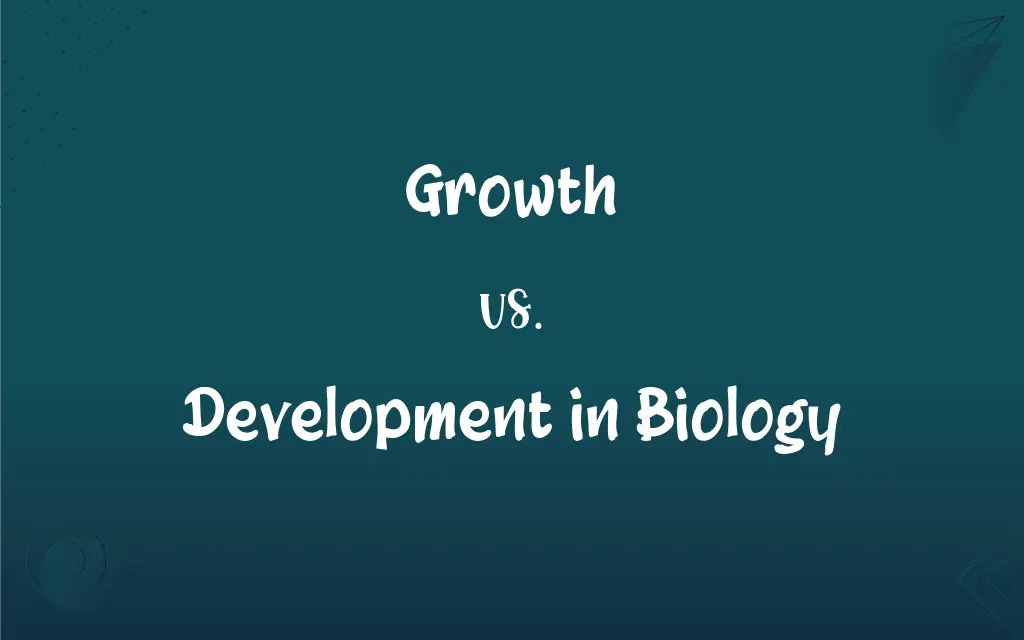Growth vs. Development in Biology: What's the Difference?
Edited by Janet White || By Harlon Moss || Updated on October 29, 2023
Growth is an increase in size or number of cells, while development is the process of change and maturation of an organism. Both are integral to an organism's life cycle.

Key Differences
Growth in biology refers to the quantitative increase in size or number of cells, leading to an increase in the size of an organism or a part of it. Development, on the other hand, is the process that leads to the maturation and differentiation of cells, tissues, and organs, ultimately resulting in a fully functional organism.
Growth is a measurable and observable phenomenon that occurs throughout the lifespan of an organism. Development encompasses the changes and transformations that an organism undergoes from the time of fertilization to maturity, including metamorphosis in some species.
While growth can be easily quantified by measuring parameters such as height, weight, and cell number, development is qualitative and involves the acquisition of various skills and abilities, as well as the maturation of the physiological systems.
In some cases, growth can continue even after an organism has reached maturity, such as the growth of hair and nails in humans. In contrast, development typically ceases once an organism reaches maturity, although some aspects of development, such as learning and memory, can continue throughout an organism's life.
Both growth and development are integral to the life cycle of an organism, as growth allows for the increase in size necessary for survival, while development ensures that an organism is capable of reproduction and other complex behaviors necessary for survival.
ADVERTISEMENT
Comparison Chart
Increase in size or number of cells
Nature of change
Maturation and differentiation
Quantitative
Measurement
Qualitative
Can continue after maturity
Continuity
Typically ceases at maturity
Observable and measurable
Observability
Not always directly observable
Integral to survival
Importance to life cycle
Integral to reproduction and behavior
ADVERTISEMENT
Growth and Development in Biology Definitions
Growth
Growth is observable and measurable.
The growth of a child can be observed and measured over time.
Development in Biology
Development is qualitative and encompasses various changes.
The development of the brain is crucial for learning and memory.
Growth
Growth can continue even after maturity.
The growth of human hair and nails continues throughout life.
Development in Biology
Development typically ceases at maturity.
The development of a tadpole into a frog is completed at maturity.
Growth
Growth is an increase in size or number of cells.
The growth of a plant is evident from its increased height and width.
Development in Biology
Development is not always directly observable.
The development of a human fetus occurs inside the womb and is not directly observable.
Growth
Growth is integral to an organism's survival.
The growth of roots is essential for a plant's survival.
Development in Biology
Development in biology refers to the process of change and maturation of an organism.
The development of a butterfly from a caterpillar is a fascinating process.
Growth
Growth can be measured quantitatively.
Scientists measured the growth of bacteria in a petri dish.
Development in Biology
Development is integral to reproduction and complex behaviors.
The development of social behaviors is essential for the survival of many species.
FAQs
Can growth continue after maturity?
Yes, growth can continue after maturity in some cases, such as the growth of hair and nails in humans.
What is growth in biology?
Growth is the quantitative increase in size or number of cells of an organism.
How is growth measured in biology?
Growth is measured quantitatively, such as by height, weight, or cell number.
Is development always directly observable?
No, development is not always directly observable, such as the development of a human fetus.
What are some examples of growth in biology?
Examples include the increase in height of a plant and the increase in size of an animal.
Can growth and development be influenced by the environment?
Yes, both growth and development can be influenced by environmental factors.
Does development cease at maturity?
Typically, development ceases at maturity, although some aspects can continue throughout life.
Are there different types of growth in biology?
Yes, there are different types of growth, such as vegetative growth and reproductive growth.
Are growth and development independent of each other?
No, growth and development are interrelated and both are integral to an organism's life cycle.
Can development be quantitative?
Development is primarily qualitative, but some aspects can be quantitatively measured.
What are some examples of development in biology?
Examples include the metamorphosis of a caterpillar into a butterfly and the maturation of a human from infancy to adulthood.
What is development in biology?
Development is the process of change and maturation that leads to a fully functional organism.
Is growth integral to survival?
Yes, growth is integral to an organism's survival.
Can development occur without growth?
Development typically involves growth, but some aspects of development can occur without a significant increase in size.
Are there different types of development in biology?
Yes, there are different types of development, such as embryonic development and post-embryonic development.
Are growth and development the same in all organisms?
No, growth and development vary among different organisms and species.
How is development measured in biology?
Development is qualitative and can be observed through changes in behavior, morphology, and physiology.
Can growth be qualitative?
No, growth is a quantitative measurement.
Is development integral to reproduction?
Yes, development is integral to reproduction and complex behaviors.
Is growth always observable?
Yes, growth is observable and measurable.
About Author
Written by
Harlon MossHarlon is a seasoned quality moderator and accomplished content writer for Difference Wiki. An alumnus of the prestigious University of California, he earned his degree in Computer Science. Leveraging his academic background, Harlon brings a meticulous and informed perspective to his work, ensuring content accuracy and excellence.
Edited by
Janet WhiteJanet White has been an esteemed writer and blogger for Difference Wiki. Holding a Master's degree in Science and Medical Journalism from the prestigious Boston University, she has consistently demonstrated her expertise and passion for her field. When she's not immersed in her work, Janet relishes her time exercising, delving into a good book, and cherishing moments with friends and family.































































